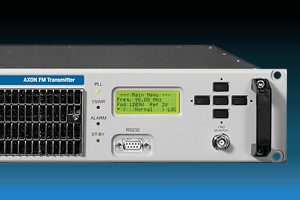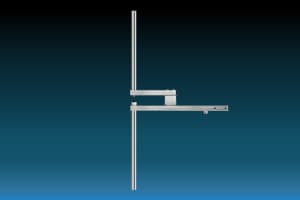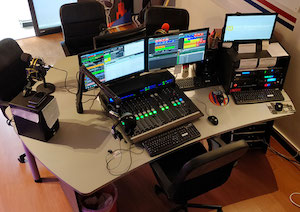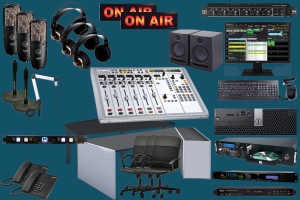Axel Oxygen 2000 - Digital Broadcast Console
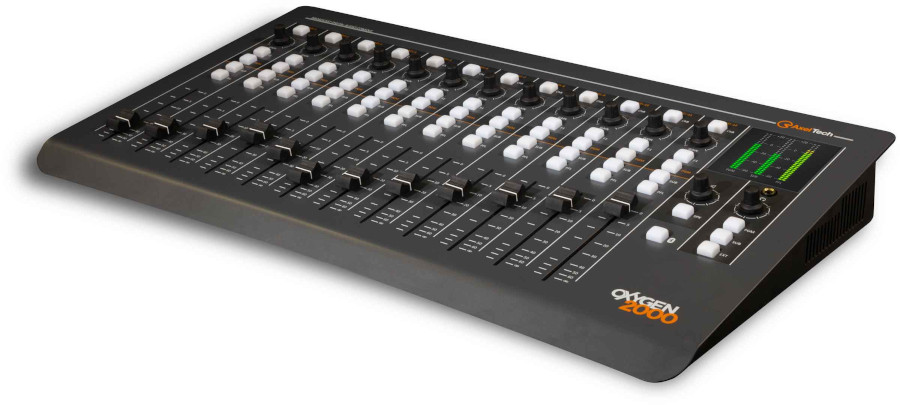
Oxygen 2000 is a fully Digital Broadcast Console designed for On Air and Production in any Radio Station: a compact 12 faders unit, with a powerful internal audio routing and a wide range of controls and I/O in a rugged and classy steel chassis.
Oxygen 2000 DSP based audio processing delivers high-end quality and guarantees latest features and flexibility.
Reliable and easy to use as an analogue mixing console Oxygen 2000 offers top class features: Low Latency, Users Preset, Smart Keys, EQ, Compressors, Telephone Hybrid, HDMI Output, Analogue and Digital I/O, USB, Bluetooth, Dante AoIP, Telco, Presenter Talk Box.
Axel Oxygen 2000 - Digital Broadcast Console
Input & Output
3 microphone inputs
4 stereo analogue inputs
4 stereo analogue outputs
1 built-in telephone hybrid,
1+4 telco interface with GPIO
Bluetooth audio interface (optional)
1 digital Out (AES/EBU)
2 USB audio interfaces (disabled with Dante option installed)
8 stereo inputs + 8 stereo outputs via Dante (optional)
General
Fully Digital Broadcast Console for Radio Broadcasting with 6 faders
A/B Fast source switch buttons for each fader
4+1 busses (PGM, SUB, Aux1, Aux2, PFL)
Near 0 latency (< 0,7 ms I/O)
Digital Signals Routing via the 48×48 internal matrix
Complete Remote Control by means of an application replicating the surface
Remote configuration and maintenance via Web Interface
User-definable Presets & Snapshot
5 bands fully parametric Equalizer on every input
Dynamic Processor with expander and compressor section on each microphone inputs
Advanced and configurable Monitor Facilities for Control Room and Studio
Customizable RGB colored buttons
High Resolution (120 leds) meter bars for outputs
HDMI Out for console status display
2 Timers (Ctrl-Room and Studio microphones timers on HDMI Monitor)
TalkBox for guest and presenter (optional)
Versions
Oxygen 2000
Oxygen 2000 – Bluetooth
Oxygen 2000 – Dante
Oxygen 2000 – Dante – Bluetooth
Options
Talk Box
RJ45 adapters for:
o Mic with GPIO
o Line In
o Line Out with GPIO
o Telco with GPIO
Microphone Inputs
3 Microphone Inputs
Mic 1 on XLR, Mic 2 & 3 on RJ45: 2-3, all balanced with + 48V Phantom and GPIO
Independent ON AIR Lights and Cut Off control, when opening Control Room and Studio microphones
PFL button switches to private conversation on Hybrid/Telco/Bluetooth mode
Enable TalkBack feature on any Studio or Control Room microphone
Parametric Compressors/Expander (drive, threshold, attack time, release time) for MICROPHONE and MONO inputs
Save and recall microphone presets including Compressor/Expander settings
Phase inversion on microphone inputs
MONO inputs assignable as EXT source
Ducking / AutoFader assignable to all sources (automatic attenuation of music on speech)
Analogue inputs
Line Stereo Inputs: 4
Balanced on XLR for Line 1, Balanced on RJ45 for Line 2-4
Channel mode selection: STEREO, MONO, L, R, INV-L, INV-R, INV
Stereo-1 & DANTE-1 inputs can be configured as 4 Telco Inputs
USB audio I/O
2 Built-in stereo USB (Type-B) I/O Audio Interfaces allow to directly connect the PC to the Oxygen 2000 console, with no need for audio cards
In facts the PC detects each of the console USB as a digital audio card with 1 stereo inputs and 1 stereo outputs for simultaneous playout and recording
Telephone hybrid and Telco
Telephone Hybrid: 1 POTS/PSTN telephone line with Line.In and Tel.Set connection
Telco: 1 in/out N-1 to connect external telephone hybrid with control via TLC/GPIO
4 mono additional Telco can be obtained configuring Analog Inputs (Stereo-1 & DANTE-1) and (OUT-2 & DANTE-1) stereo outputs.
GPI and GPO management on all 5 Telco channels
RING and HOOK on F1 key for each TELCO channels
N-1 on Telco outputs for all BUS (PGM, SUB, AUX-1, and AUX-2)
Analogue outputs
4 Balanced Outputs:
OUT-1 – XLR – Fixed as PGM
OUT-2 – XLR – by default assigned as SUB
OUT-3 – RJ45 – by default assigned as AUX-1
OUT-4 – RJ45 – by default assigned as AUX-2
OUT-2 stereo output can be configured as N-1 to achieve up to 2 mono additional Telco
OUT-1 & OUT-2 outputs are both equipped with a GPO
Digital output
1 AES/EBU output on XLR
Headphones and local monitor outputs
OUT-2-4 outputs: can be configured as Studio Presenter and Studio Guest Headphones
Unbalanced outputs: 2 Line out on Jack 6.3 for Control Room Headphones
Adjustable maximum Control Room and Studio speakers volume (Studio Speaker only via SW)
Adjustable maximum Control Room and Studio headphones volume (Studio Headphones only via SW)
Adjustable CUT or Attenuation mode (-40, -30, -20, -10 dB) on Control Room and Studio speakers
Independent source selection (PGM, SUB, AUX1, AUX2, EXT) for control room and studio speakers, control room and studio headphones with or without PFL
Independent Talk Back management on Control Room and Studio speakers
Independent Talk Back management on Control Room, Studio headphones
Same source selection for Control Room and Studio headphones, with independent level
GPI/GPO
GPI: 9 in total, for Talk back, Telephone Hybrid or other features
GPO: 9 total, to control OnAir lamps or provide HOOK and RING commands for external telephone Hybrid
User custom GPIs (e.g. Ring, Talkback, channel ON/OFF, etc.)
User custom GPOs (e.g. Hook/ONAIR, Studio-Light, Control Room-Light)
Surface & Management
Automatic firmware update via Internet
WEB UI for Console configuration and service features (Save, restore, update, logs, etc.)
Save and recall EQ presets (up to 10)
New real-time EQ algorithm with graphic
Fast and accurate Led Meters display
Save and recall control panel configuration with 10 Snapshots
Save and recall total console configuration. The configuration can be saved to internal memory (microSD), USB and PC (via WEB interface)
Gain adjustment knobs with adaptive speed
Dimmable buttons light
Adjustable fader ON/OFF threshold (from -50 dB to 0 dB)
Telephone Hybrid and Telco
The built-in telephone hybrid allows direct connection of a telephone line POTS/PSTN on RJ-11C. The audio is processed via DSP that delivers a state-of-the-art audio processing. It’s also available a Telco N-1 in/out, to connect Oxygen 2000 to an external telephone hybrid. The Telco N-1 is always available on RJ45. TLC commands are available on the same RJ45 with Hook and Ring interface.
TLC commands for Telco-2-5 are available and configurable on GPIO-DB9 connector with Hook and Ring.
HDMI output
The HDMI output allows to connect an HD display monitor to the console, suitable to be used in two flavours:
Monitor, that displays the following information:
Audio input source levels
4+1 BUS output levels
A/B source names assigned of 10 channels
Display On-Air sources
Microphone On timer (control room & studio)
Large Clock
Audio output level (Loudspeakers & Headphones)
On-Air microphone
Telephone active
Configure, for configuring all of the device features.
HDMI output combined with 4 rotary knobs allow the fast and intuitive programming of all the mixer parameters.
The programming GUI has been designed in order to be very easy and intuitive.
Selectable home page layouts are available, with many theme icons.
HDMI output can be personalized with the customer logo. Selectable display layouts are available.
Specs
Analog Balanced Microphone Inputs
Connector RJ45 & XLR Balanced – EMI Suppressed
Input Impedance 2,4 KΩ
Nominal Input Level (sensitivity) -9/-66 dBu
Max Input Level (clipping point) +9 dBu
A/D conversion 24 bit / 48 Khz
Signal To Noise Ratio (referred to peak level) >90 dB
THD+N <0,01%
Analog Gain Adjustable +0 ÷ +57 dB (3dB step)
Phantom Power +48V
Analog Balanced Stereo Inputs
Connector XLR & RJ45 Balanced – EMI Suppressed
Input Impedance 10 KΩ
Nominal Input Level (sensitivity) 0 dBu
Max Input Level (clipping point) +18 dBu
A/D conversion 24 bit / 48 Khz
Frequency response +/-0,5 dB from 20 Hz to 20 kHz
Signal To Noise Ratio (referred to peak level) >100 dB
Stereo Separation (referred to peak level) >90 dB
THD+N <0,002 %
Analog Balanced Telco Input
Connector RJ45 Balanced – EMI Suppressed
Input Impedance 10 KΩ
Nominal Input Level (sensitivity) 0 dBu
Max Input Level (clipping point) +18 dBu
A/D conversion 24 bit / 48 Khz
Signal To Noise Ratio (referred to peak level) >100 dB
THD+N <0,002%
PSTN Interface
Connector RJ11
Transhybrid loss >20 dB
Analog Balanced Stereo Outputs
Connector RJ45 Balanced – EMI Suppressed
Output Impedance 23 Ω, nominal 600 Ω
Nominal Output Level 0 dBu
Max Output Level (clipping point) +18 dBu
D/A conversion 24 bit / 48 Khz
Signal To Noise Ratio (referred to peak level) >100 dB
Stereo Separation (referred to peak level) >90 dB
THD+N <0,002 %
USB Audio Digital I/O
Connector USB Type B – EMI Suppressed
Playback And Recording Sample Rate SRC 44.1-48 KHz
Resolution 16 bit
Available Stereo Channels 1 Play & 1 Rec for each USB interface
Digital Output
Connector Balanced on 1 XLR – EMI Suppressed
Input Impedance 110 Ω
Standard AES3
Audio Sample Rate 48 KHz
Resolution 24 bit
Dynamic Range (Converter Values) 124 dB
Analog Balanced Telco Output
Connector RJ45 Balanced – EMI Suppressed
Output Impedance 23 Ω, nominal 600 Ω
Nominal Output Level 0 dBu
Max Output Level (clipping point) +18 dBu
D/A conversion 24 bit / 48 Khz
Signal To Noise Ratio (referred to peak level) >100 dB
THD+N <0,002 %
System
Audio Core Analog Devices ADAU1452 32bit 294 MHz fixed point DSP
Audio CODECs Cirrus CS42448 24 bit/192 kHz
System Core Allwinner A20 dual core cortex-A7 at 800MHz, 1GB RAM
LAN Connection RJ45 - 100Mbit
Nominal Delay (analog input to analog output) 0,7 ms
GPIO Inputs/Outputs 4 GPI/4 GPO on DB9; 4 GPI/2 GPO on Mic2 & Mic3 RJ45; 2 GPO on Out3 & Out4 RJ45; 1 GPI/1 GPO on Telco RJ45
Communication Port 2xUSB type-A, 2xUSB type-B , 1xLAN, 1xHDMI
Operating Temperature 0°C ÷ 40°C
PSU
Power Supply 90-260 VAC / 47-63 Hz / 30 W
Dimensions
Dimensions (W; H; D) 614mm; 80mm; 343mm
Weight 7.1 Kg
Recommended products
no products avaible
 BACK TO ON-AIR STUDIO
BACK TO ON-AIR STUDIO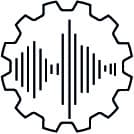 AUDIO INTERFACES
AUDIO INTERFACES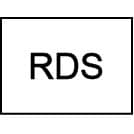 RDS ENCODER
RDS ENCODER STUDIO ACCESSORIES
STUDIO ACCESSORIES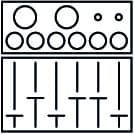 AUDIO MIXER
AUDIO MIXER